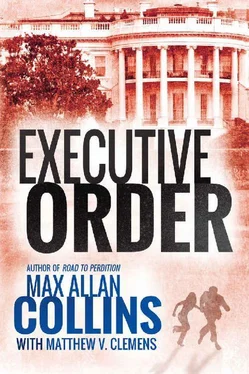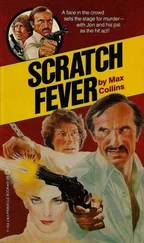“Yes, ma’am.”
“Make this investigation your task force’s priority. Get right on it.”
She rose, nodding. “Yes, ma’am.”
Rogers was halfway out the AD’s inner-office door when Fisk called out, “Oh, and Rogers?”
“Yes, ma’am?”
“Good work.”
“Thank you, ma’am.”
She flew through the outer office, thinking that sometimes a trip to the principal’s office wasn’t so terrible after all.
When Rogers got downstairs to the bullpen of the Special Situations Task Force, the team was waiting for her, having been assembled by Miggie at her request before she went up to see the AD.
Half a dozen desks, with no cubicles but plenty of space, faced a video screen that took up much of a wall; a small table looking back at them was reserved for Rogers in briefing mode, and she took her seat there. Smaller video screens were here and there around the room, and of course several offices in back — her own, Miggie’s, and an unassigned one that had been reserved for Reeder as consultant.
Miggie was sitting at the desk he used when not in his office. Hardesy and his usual partner, Anne Nichols, had desks next to each other. Tall and fashion-model striking, the African American Nichols was as tough as she was stylish, and she was plenty stylish. Today she wore a single-breasted, gold-buttoned black business suit and leopard-print blouse.
The other pair of field agents, Jerry Bohannon and Reggie Wade, made up the more senior team, having been partners for years now.
The craggily handsome, fortyish Bohannon had started dating a woman his own age a while back, his post-divorce second childhood finally over, and consequently had stopped dyeing his hair, the natural gray at his temples giving him a distinguished look. So did his navy worsted suit, solid light blue tie, and blue-and-white-striped white-collared shirt.
The six-foot-four, African American Wade was a seasoned investigator who liked to push the limits of the Bureau’s regulations of what comprised the acceptable “look” of an FBI agent. Today he was risking a black vested suit with black shirt and black skinny tie — all that black, yet the style of it said Italian.
The final member of the team, behaviorist/profiler Trevor Ivanek, was a balding human scarecrow with a broad forehead over deep-set eyes. Open-collar dress shirt under a sweater vest gave him the air of the scholar he was. For a man who spent so much time trying to understand monsters, he had a quick, easy wit.
Rogers got up from the table facing the team and rolled out a whiteboard that she’d asked Miggie to call down for. Something this low-tech was rarely used anymore, but it gave her a form of communication that the security camera behind her could not witness.
When she finished outlining what she and Fisk had just talked about, to an audience whose expressions ranged from squinting skepticism to wide-eyed alarm, Ivanek was first to speak up.
“With all due respect, Agent Rogers, you and Mr. Reeder are bucking for a psychiatric evaluation.”
Wryly amused, Wade asked, “That your considered expert opinion, Doctor?”
His eyes staying on Rogers, Ivanek said, “I don’t doubt that you have outlined some troubling events, chiefly the assassination of a cabinet member. And that seems entirely appropriate for an examination by this task force. But making the leap to a conspiracy within our government is ill-advised, reckless, and even foolish.”
Hardesy said, “Then put me down for a psych session, too, Doc. I was standing right next to the black ops operative who got eliminated by a sniper. And I for one find it highly suggestive when four CIA agents get themselves killed where they were forbidden to be by, oh, just the President.” He glanced around the bullpen. “Reeder and Rogers are right. We’ve got players on the inside who’ve gone rogue.”
Shaking his head, Ivanek said, “Conspiracies are fine in fiction, but in the real world they’re almost impossible to keep hidden, especially something on this scale.”
Rogers said, “But we don’t know the scale of it. We could be dealing with a handful of people... but powerful people.”
“Most so-called conspiracies,” Ivanek said, “are simply the individual acts of, say, police officers trying for the makings of an easy conviction, or politicos drumming up pseudo-scandals on a major figure from the other side. But sending agents overseas to die and tying it to the death of a cabinet member, even the probable murder of that cabinet member... it’s strictly Through-the-Looking-Glass stuff.”
With a pretty eyebrow arched, Nichols said, “That little party at the Capitol last year — you were here for that, right?”
Ivanek nodded. “I was. And ever since 9/11, we have lived in a curiouser-and-curiouser world. I grant you that. But Agent Rogers and Mr. Reeder are still making an ill-advised leap. My opinion is that we begin with the assassination of Secretary Yellich and treat it like what it is: a murder case.”
“I have no problem with that,” Rogers said. “But I would request that everyone here keep in mind the context that I’ve provided. If the people we’re up against are as powerful as I think, then every person in this room is an insect that could easily be swatted.”
Wade shifted his long-legged body and said, “Okay, so we’ve got a case, and just the kind of major-league case that might just keep our little Sit boat afloat. Where do we start, boss?”
“We’ll begin with computer checks,” she said, for the benefit of any bugs in the room. But on the whiteboard she wrote: NO USE OF BUREAU EQUIPMENT. WILL EXPLAIN. STRICTLY SUB ROSA. Then she wiped it clean.
“Why?” Bohannon asked, a question that might have been for either the spoken comment or the written one.
Rogers said, “They may have left a computer trail, and we’ll get Miggie all over that.” But again, as she spoke, she wrote: MOLES. TRUST NO ONE BUT THE TEAM. She wiped the board clean.
“Reeder can be considered a part of this team,” she went on, “but he has his own agenda. Our focus is, as Trevor has correctly advised, finding out who is behind the murder of Secretary Yellich.”
As she spoke, she wrote: NO PERSONAL PHONES. NO BUREAU EMAIL. Again she wiped the board clean.
Bohannon rose, smoothed his suit coat, and went to the whiteboard, taking the marker from Rogers, and wrote: HOW DO WE COMMUNICATE? He erased that and watched her write: BURNER PHONES ASAP. She erased that, and Bohannon nodded and returned to his desk.
Wade asked, “So, where do we start, boss?”
Writing REAL ASSIGNMENTS on the whiteboard, Rogers said, “Reggie, you and Jerry take another look at Yellich — personal life, her staffers... make sure we didn’t miss anything.”
Wade nodded. Bohannon, too.
“Miggie, these people must have left a trail somewhere. Find it. Follow it.”
She wrote: APARTMENT HOUSE SHOOTER’S DNA. FROM DC HOMICIDE.
Miggie nodded as she erased the message.
“Lucas,” she said, “you, Anne, and I have a job in the field to do.”
She wrote in very big letters, and underlined: WATCH YOUR ASSES. Then she swept the board clean.
When she, Hardesy, and Nichols were in the corridor, Rogers said, “We’re going to visit Tony Wooten’s parents.”
“Do you think they know,” Hardesy asked, “what kind of mischief sonny boy was up to?”
Bohannon said, “Name a terrorist who lived at home whose mommy didn’t know he was making bombs.”
“Good point,” Hardesy admitted.
“Don’t assume the worst about them,” Rogers advised. “Remember, they won’t have been informed about their son’s death — Miggie’s digging is what turned up Tony Evans’ real identity, and so far we’re the only good guys who know it.”
Читать дальше












